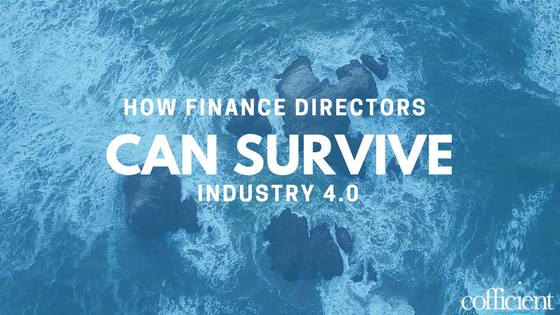
How Finance Directors Can Survive Industry 4.0
The world is constantly changing. Digital connectivity is simultaneously bringing the world closer together while highlighting what makes everyone and everything different. Do you remember Blockbuster or Kodak? These companies didn’t embrace new smart technologies and were sadly left behind.
In an Industry 4.0 world, smart technologies will redefine industry and business models. Consumers will have significantly more purchasing power over what and how they buy. Automation will continue to displace manual work, whilst also creating new jobs and sectors. The ability to join up and analyse vast amounts of data will generate extraordinary insights into ourselves, our organisations and our societies.
The finance function will be no exception to these forces for change. Finance Directors will need to respond, both in terms of supporting business in the face of disruption and ensuring the finance function is fit for a Industry 4.0 world. However, with the erosion of trust in institutions and businesses we are witnessing today, purpose, trust and transparency will become central to the way organisations interact with their stakeholders.
In this increasingly complex world, how does finance stay relevant and trusted by those who rely on what it does?
Challenge of old and fragmented systems
Many finance departments have legacy systems, often with multiple instances, complex processes and deeply embedded, disparate sources of data. Companies have invested huge sums over a number of years in making these systems stable. Paradoxically, it is this stability that could potentially pose the greatest obstacle to change. Businesses may see greater risk from changing a system that ‘works’ for today, rather than adapting and evolving for the future.
What’s clear however, is that retaining the status quo simply isn’t an option. Disruption is impacting all industries and professions. Finance Directors that embrace the opportunity will be future proofing their finance department for the years to come, while also ensuring that their company is able to better communicate with its stakeholders.
Impact of new technologies
One of the key issues is that financial reporting has struggled to keep pace with business evolution and doesn’t report some of the measures that are crucial to today’s businesses. A lack of timeliness of reporting also adds to the problem.
Analytic technologies are already enabling some companies to extract and process huge volumes of data from both inside and outside the organisation, delivering new and better insights.
These technologies will enable the Finance Directors and the finance department to add significantly more value to the business at speeds much faster than today. This will be in real time, at a greatly reduced cost, with higher levels of automated control and lower levels of risk.
New technologies are part of the solution but the finance profession will need to re-evaluate what is reported and to whom.
The Power of the Internet of Things
On a basic level, the Internet of Things revolves around different devices, sometimes devices which never before have been connected to the Internet, communicating with one another. Manufacturing equipment can be connected and transmit data, which allows businesses to respond faster to developing situations.
For example, a piece of industrial machinery can now transmit a warning of when it is about to fail or is nearing the end of its lifespan. Before, a factory would either have to spend hundreds of man-hours checking machinery, including your signal booster, to make sure everything is in order, waste space and money storing spares in case a piece happened to fail, or even shut down should that piece suddenly fail without warning. Now, a factory can order parts only when they need it, eliminating downtime, saving money, and making machine failures far less frequent.
For Finance Directors, this data can be communicated to their business system. Giving them better intelligence in what machine makes money and what isn’t.
The transition for Finance Director to wholeheartedly embrace Industry 4.0 will take time, as finance directors slowly upgrade their equipment and learn how to use data to make smart decisions. But whether it comes slowly or quickly, Industry 4.0 is coming.
To talk to some people who know a thing or two about the best software for your growing business click here.



